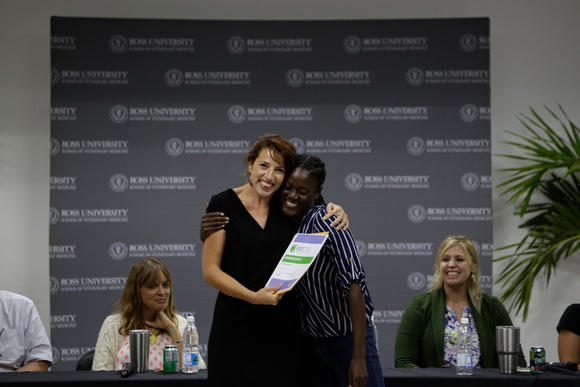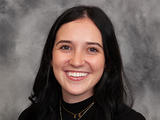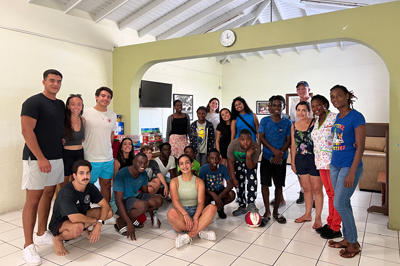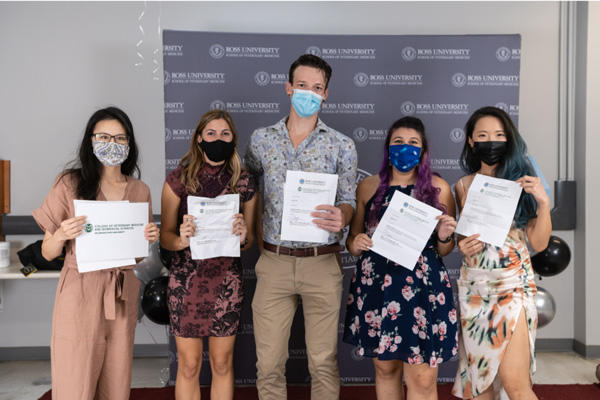For the first time, as part of Research Day 2018, Ross University School of Veterinary Medicine (RUSVM) hosted the Three Minute Thesis (3MT) competition. The international competition 3MTR was founded by the University of Queensland, with over 600 schools participating. This year, RUSVM was the first school in the Caribbean region to participate.
The competition brought together 10 competitors from the University spanning DVM students, postgraduate students and an RUSVM colleague, to deliver passionate presentations in three minutes. Nicole Atherley was declared the first student from RUSVM to win the 2018 3MT competition.
Nicole hails from the neighboring Caribbean island of Barbados, and as part of a collaboration led by Dr. Mark Freeman of RUSVM and Dr. Frank Cézilly of the Caribaea Initiative, she is now in the second year of her PhD, investigating the biology, ecology and diseases of the Caribbean spiny lobster.
With the support of St Kitts Department of Marine Resources, Nicole is conducting an assessment of the lobster population in Saint Kitts, which includes investigating size, sexual maturity and age of the lobsters in the area, ultimately hoping that results from this study can guide the policymakers responsible for lobster conservation efforts. Data generated from this study will also allow for the identification and screening of diseases present in lobsters that may impact lobster fisheries.
Here’s Nicole’s take on winning this year’s 3MT competition:
What motivated you to choose your research topic?
This lobster species is important to the livelihood of many fishermen across the Caribbean. It is our intention for this research to benefit fishermen and countries that use this resource. We all want the lobster population to be able to sustain fisheries, and we all want to be sure there are no diseases that may reduce our lobster supply. Ross University School of Veterinary Medicine and the Caribaea Initiative saw this as an important venture and created this project to that end.
Share a highlight of completing your research work?
One highlight is being able to become SCUBA certified and conduct experiments in the field on small lobsters that come from the open water to settle off the coast of Saint Kitts. I am thankful to the Department of Marine Resources for this opportunity.
What inspired you to enter the 3MT competition?
The team in the research office encouraged us to take part in this competition. Dr. Anna Becker and Ruth Braganza educated us about the 3MT competition and encouraged us to make the most of this exercise.
How will the prize that you received help your future work and research?
The prize money is to go towards the expenses of attending a conference. I look forward to the opportunity to do so and present some of my work to those in attendance.
What advice would you give to researchers across the region on promoting their works?
Attending and presenting your work at conferences always helps to make your work more visible. This and other activities such as the 3MT may cause you to step out of your comfort zone, but it is definitely a learning experience and can only benefit you and bring awareness to your work.
When Nicole is not conducting her research or studying, she is working out and eating healthy meals. This health advocate is also a master chef. When time allows, she enjoys attending church, and reading a good book; and like the true Caribbean woman that she is, she loves nature too!
If you’d like to get involved in research, study for a MSc or PhD, or gain skills in presenting contact the Research & Postgraduate team at research@rossvet.edu.kn or postgrad@rossvet.edu.kn.
The 3MTR is an international competition, founded by the University of Queensland, with over 600 schools participating, and RUSVM being the first school in the Caribbean region to participate! Students are invited to present their research to the audience and panel of judges in no more than three minutes – no props, no script ....just one static slide.








